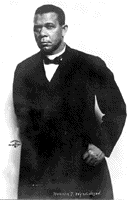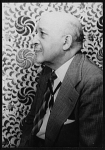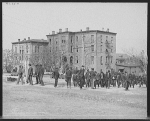Today in History: September 18
Prof. Booker T. Washington…stood on the platform of the Auditorium, with the sun shining over the heads of his hearers into his eyes, and his whole face lit up with the fire of prophecy …It electrified the audience, and the response was as if it had come from the throat of a whirlwind.James B. Creelman,
"The Effect of Booker T. Washington's Atlanta Speech,"
from the New York World, September 19, 1895.
African American Perspectives, 1818-1907

Booker T. Washington,
copyright C.M. Battey,
circa 1890.
The African American Odyssey: A Quest for Full Citizenship
On September 18, 1895, Booker T. Washington delivered his famous "Atlanta Compromise" speech at the opening of the Cotton States and International Exhibition in Atlanta, Georgia. Washington, the founder and president of the Tuskegee Normal and Industrial Institute, was the first African-American man ever to address a racially-mixed Southern audience. He used the occasion to advocate a moderate approach to race relations in the New South:
To those of my race who depend on bettering their condition in a foreign land, or who underestimate the importance of cultivating friendly relations with the Southern white man, I would say: "Cast down your bucket where you are—cast it down in making friends in every manly way of the people of all races by whom we are surrounded.""Address of Booker T. Washington,"
Atlanta, Georgia, September 18, 1895.
African American Perspectives, 1818-1907
Weary of the violence and turbulence that attended Reconstruction in the South, Washington's philosophy of self-help, political gradualism, and accommodation to the ideology of race appealed to most white and many black Americans.
Challenge to Washington's Leadership
Some African American leaders, including W.E.B. Du Bois, rejected Washington's emphasis on gradual economic and social advancement in favor of immediate political and intellectual empowerment. A Fisk graduate with a Harvard doctorate, in 1905 Du Bois organized an "anti-Bookerite" movement calling for immediate political and social equality. In 1909, Du Bois's group joined with white liberals to form the National Association for the Advancement of Colored People (NAACP). The NAACP battled racial injustice through the legal system. In 1954, NAACP lawyer Thurgood Marshall successfully argued the Brown v. Board of Education of Topeka case. In this landmark decision, the Supreme Court overturned Plessy v. Ferguson ruling public school segregation violated rights guaranteed by the 14th Amendment.

Dr. W. E. B. Du Bois,
Carl Van Vechten, photographer,
July 18, 1946.
Creative Americans: Portraits by Carl Van Vechten, 1932-1964
Booker T. Washington was born in 1856 on the plantation of James Burroughs near Hale's Ford, Virginia. In 1865, his family moved to West Virginia where Washington worked for a short time in a salt furnace and a coal mine. While attending the Hampton Institute, in Hampton, Virginia, Washington came under the influence of school founder Samuel Chapman Armstrong whom he credited with instilling in him a strong work ethic. After graduating from Hampton, Washington returned to Malden, West Virginia, and taught school for several years.

Alabama Hall,
Tuskegee Institute,
Tuskegee, Alabama,
ca. 1906.
Touring Turn-of-the-Century America, 1880-1920
In 1881, Washington established the Tuskegee Institute in Alabama. With his political savvy and talent for fund-raising, he quickly transformed the small collection of dilapidated buildings into one of the finest and most renowned African-American educational institutions in the country.
From 1895 to 1915, Washington was probably the most politically powerful African-American in the country. Highly regarded by Northern philanthropists, lauded by Republican Presidents Theodore Roosevelt and William Howard Taft, and hailed as a leader by members of the African-American press, Washington's authority crossed racial lines. He received honorary degrees from Harvard University and Dartmouth College. His autobiography, the classic Up From Slavery, has been translated into many languages and read all over the world. Overcome by a life of service and hard work, Washington died on November 14, 1915 at the age of fifty-nine.
Let down your bucket
Where you are:
Your fate is here
And not afar
You may carve a dream
With an humble tool
And the tallest tower
Can tumble down
If it be not rooted
In solid ground.Langston Hughes,
drafts of "Ballad of Booker T.,"
May 30 - June 1, 1941.
Words and Deeds in American History
Learn more about the African-American experience:
- The collection African American Perspectives, 1818-1907 contains the complete text of Washington's Atlanta Address as well as additional speeches by Washington. See the special presentation, The Progress of a People, and the Timeline of African American History, 1852-1925 associated with this collection.
- Visit the online exhibitions The African-American Mosaic and The African American Odyssey: A Quest for Full Citizenship.
- In 1900, Booker T. Washington founded the National Negro Business League. The collection Prosperity and Thrift: The Coolidge Era and the Consumer Economy, 1921-1929 contains fifteen items documenting the League's activities during the 1920s. To locate these materials, search the collection on Booker T. Washington.
- Learn more about the racial climate in which Washington lived and worked by reading personal accounts of the post-Civil War era in American Life Histories, 1936-1940. To find them, search the collection on Reconstruction or browse through the interviews by state.
- Examine drafts of Langston Hughes's poem, "Ballad of Booker T." in the collection Words and Deeds in American History. Composed in 1941, the poem echoes the words of his Atlanta Compromise speech and vindicates Washington's reputation.